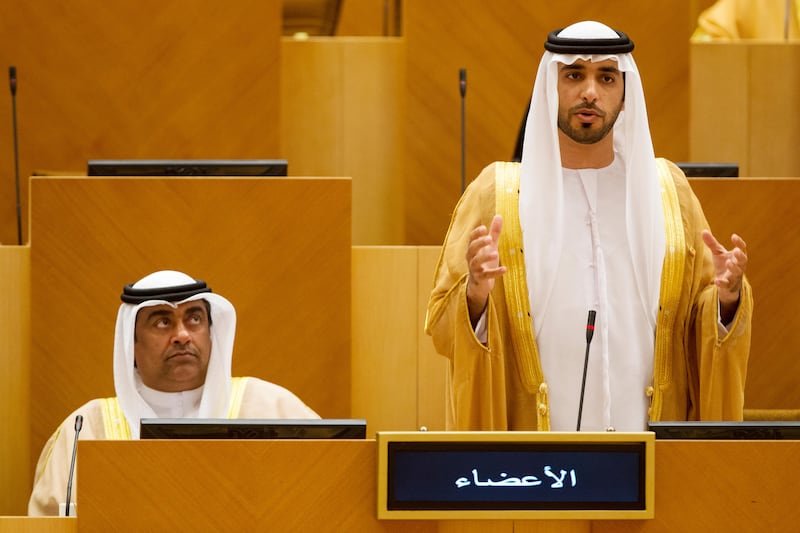Religious figures such as muftis should have a presence on social media to ensure young people don’t go searching for advice and guidance elsewhere, a member of the UAE's Federal National Council said on Tuesday.
Saeed Al Remeithi, the youngest member of the chamber, said direct contact with the public was important - and social media is the key medium today.
He asked the Authority of Islamic Affairs & Endowments, known as Awqaf, how it was training and preparing religious figures for the online world.
“We want the authority to have followers on social media, to keep up with updates and have direct contact with the public," Mr Al Remeithi said.
“The fear today is that people looking for fatwas in the UAE will go outside to look for it, if they were not able to find it here, and eventually listen to fatwas that we don’t want them to listen to.
“We want to prevent our nationals from listening to fatwas from outside the country."
He also asked the head of the authority about their policy with regards to some of their muftis posting fatwas on their personal social media accounts.
Awqaf chief Dr Mohammed Al Kaabi said none of the authority’s muftis have accounts on social media to issue fatwas on.
However, with the formation of the UAE Fatwa Council by the cabinet in May, which will govern and unify fatwa issuance across the country, this issue will be covered, he said.
______________
Read more:
[ UAE's new fatwa council 'will help fight extreme religious teachings' ]
[ The Abu Dhabi fatwa call centre where women have the answers ]
______________
Currently there are 50 trainee muftis studying at Al Muwatta Islamic Research Centre, and 50 others studying sharia at Mohammed V University in Abu Dhabi. Once they graduate they will observe social media inquiries and address them.
“So there will be a response from their side," Dr Al Kaabi said.
Also, every mufti which appears on radio, television or the internet has to be authorised by the council, so the process will be well regulated.
“We are in the process of activating the council and appointing a chair and members, and with that there will be better control over fatwa issuance," Dr Al Kaabi said.
Dr Al Kaabi said the authority’s fatwa centre, which was launched in 2008, already issues religious edicts to the public through phone calls, text messages, and electronically on the website. Users can also search through thousands of archived fatwas available on the authority’s website if their fatwa query has been already answered before.
The centre also receives calls from people outside the UAE, so it has become globally recognised as a sample of religious moderation, he said. It receives about 1,300 calls per day.
“The authority addresses fatwas with caution and follows the collective fatwa method because it is more accurate,” Me Al Kaabi said.
Mr Al Remeithi said he was impressed that so many people use the centre, including from abroad, but stressed the need for a social media presence.
Earlier this year, experts said the fatwa council would seek to counter controversial and hard-line fatwas spread on the internet by unauthorised sources.
It means the UAE will bring the rulings under a single body to ensure reasoned and moderate judgments.
The fatwa department at Al Azhar University in Cairo, the global seat of Sunni Muslim learning, has complained of “fatwa chaos” in the past, with some religious figures seeking to shape the actions of the faithful across the Muslim world. Edicts have governed topics ranging from relationships to politics to home life.
On Tuesday, the FNC also passed a draft law that regulates mosques around the country.
Under the new law, anyone who practices an activity that breaches the security or sacredness of mosques will be fined between Dh20,000 and Dh50,000, and/or a minimum of three months’ jail sentence.
Anyone who begs, interferes with preaching or calling for prayers, faces up to three months in jail and/or a fine up to Dh5,000. The same penalty applies to a number of other prohibited activities which include preaching or holding religious lessons, collecting donations, establishing libraries, recruiting someone, holding social events or gatherings - without prior approval from the authorities.
The law also made it mandatory to only recruit Emiratis in mosques, and for them to have a history of good conduct, haven’t been convicted with an indecent offence, to have the proper accredited medical qualifications, and to be medically fit.







